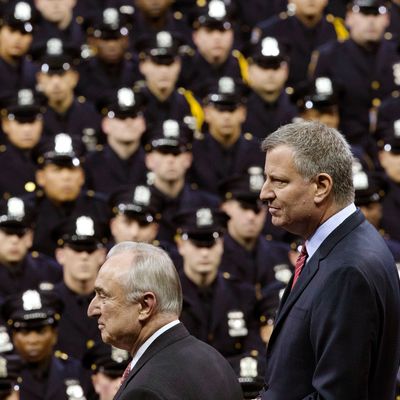
Skepticism and hostility toward police officers is at a high point. Meanwhile crime statistics, in most major categories, remain at historic lows. And New York has never had a more liberal mayor, who as recently as three weeks ago was saying that the NYPD’s head count is just fine where it is.
So last night Mayor Bill de Blasio announced the city will add 1,300 new cops. Go figure.
Okay, we will. Starting with the city’s good financial health. On Monday, for example, state comptroller Tom DiNapoli reported that state tax revenues for May were nearly $4 billion, which was $166* million ahead of projections; much of that money comes from the rebound of the city’s financial industry.
The mayor is requiring the NYPD to trim overtime as part of the new budget, but the robust income of recent years enables de Blasio to add not just cops but library hours and gym teachers and an extra week of city beach openings. Never mind that the new cops will add millions in new pension costs — Dante de Blasio will be mayor by then.
But the politics behind this move are more complicated and intriguing. Melissa Mark-Viverito, the city council speaker, has been prescient and persistent, pushing for an increased NYPD headcount for nearly two years as part of a criminal justice agenda that included decriminalizing some low-level offenses and establishing a fund to help poor people who’ve been arrested make bail. The package, Mark-Viverito argued, would increase fairness as well as public safety; advocating for it has also raised her political profile.
The key actors in getting more cops on the payroll, though, are de Blasio and Bill Bratton. Publicly the police commissioner has gone from saying he was “comfortable” with the size of the force to last year sort of advocating for more cops to, this spring, “looking for a lot more police officers.” Behind the scenes Bratton has been consistent, claiming that one hidden reason for police-community friction was the loss of 6,000 cops during the Bloomberg years, which Bratton says drove his predecessor, Ray Kelly, to throw inexperienced younger officers at neighborhoods with spiking crime.
Lately Bratton has been emphasizing a particular selling point: That the new cops won’t be doing the same old policing. An increase in manpower, in the commissioner’s plan, is necessary to free up police officers to interact with civilians in ways not involving handcuffs.
That synched with one of de Blasio’s highest priorities, to show that a progressive can keep the city safe while mending relations between cops and minority communities (not all the new hires will go to neighborhoods — 300 will be assigned to the NYPD’s counterterrorism unit). “There’s going to be a natural instinct to assume that adding more cops means they’ll be doing the exact same thing cops are doing now,” a mayoral advisor says. “Officers will still do radio runs and calls for service, but there’s going to be a carve-out of time to walk neighborhoods, meet people, and develop relationships that build trust and are not based on being the victim of a crime.”
De Blasio knew that he would be blasted by advocates of police reform, and sure enough, today those voices are loud and angry. But the mayor’s poll numbers remain strong with his base of black, brown, and white liberal voters, and right now there is no plausible challenger to his left in 2017, when de Blasio is up for re-election.
The greater risk to the mayor — not to mention the citizenry — is that crime spikes. Shootings remain a stubborn problem in some of the neighborhoods where stop-and-frisk has declined the most, and homicides by gunfire are up sharply from last year. The tabloids, and recently Ray Kelly, have been eagerly drawing a connection and blaming de Blasio.
The mayor, by agreeing to add cops, looks as if that criticism struck a nerve. On the plus side, he should get credit for flexibility and for a willingness to compromise. The larger, longer-term significance of last night’s deal, though, is that Bill de Blasio has tied himself even tighter, both practically and politically, to Bill Bratton succeeding in this progressive policing experiment.
* This post originally stated that tax revenues were $4 billion ahead of projections. Revenues were $166 million ahead of projections. The post has since been corrected.





























